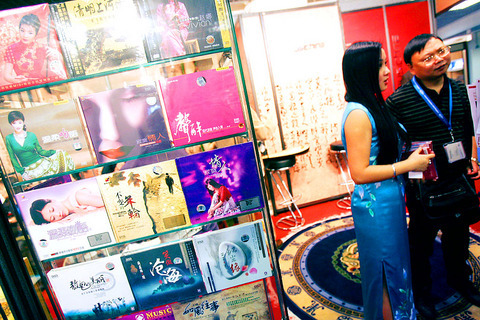From dark gothic Taiwanese rock to Japanese bossa nova, Chinese classical crossover and Korean opera, the sounds of Asia are blasting this year's annual MIDEM music industry market.
As the digital music revolution that took off in Asia's digital power houses gains worldwide momentum, music, mobile and gaming industries in both East and West are hungering for a bigger slice of action in each other's territories.
And signs that China's potentially massive market is beginning to court foreign companies ahead of the Beijing Olympics has whipped up a buzz of anticipation across the trade floor of the world's premier music trade show.

PHOTO: AFP
The world is now "looking to China as it develops and becomes a world power," China specialist Alastair Hunt of SWAT Enterprises said at a conference at MIDEM, which is seeing its largest Asian presence ever.
Japan, now the world's second-largest music market, is the biggest Asian attendee, with a pavilion hosting 127 companies.
But the spotlight has also turned to China, which has brought its largest official delegation ever to Cannes, with some 30 companies.
Still, with Internet and physical CD piracy rife across Asia, and in China in particular, the Western music world is extremely cautious about venturing into Asian markets.
The latest statistics from the International Federation of the Phonographic Industry (IFPI) say it all.
While digital music sales in the US, the world's biggest music market, clocked up US$635 million last year, they registered zero in China, the world's fastest growing economy.
Despite that, the IFPI report noted that new markets like China that were historically closed to legitimate business by ruinous levels of piracy now are offering the prospect of a "leap to digital."
Moreover, China appears to be battling hard to curb piracy and is keen to publicize the fact.
This will be a reassuring message for the music executives who have packed the large number of Asia-oriented conferences held in parallel to the hectic bread-and-butter business of buying and selling.
But they will probably also follow the advice of the experts to take their time to get to know their potential markets.
Meanwhile, live Asian groups are turning up the volume at the trade fair, with Taiwan in the limelight on Monday evening at a Taiwan Beat night.
A showcase for three totally different local acts, the gig could prove to be an international break for dark, gothic rockers Chthonic, refined electro artist Lim Giong (林強) and carnivalesque Hohak Band's mix of tribal music with modern sounds.

PREPAREDNESS: Given the difficulty of importing ammunition during wartime, the Ministry of National Defense said it would prioritize ‘coproduction’ partnerships A newly formed unit of the Marine Corps tasked with land-based security operations has recently replaced its aging, domestically produced rifles with more advanced, US-made M4A1 rifles, a source said yesterday. The unnamed source familiar with the matter said the First Security Battalion of the Marine Corps’ Air Defense and Base Guard Group has replaced its older T65K2 rifles, which have been in service since the late 1980s, with the newly received M4A1s. The source did not say exactly when the upgrade took place or how many M4A1s were issued to the battalion. The confirmation came after Chinese-language media reported

A Ministry of Foreign Affairs official yesterday said that a delegation that visited China for an APEC meeting did not receive any kind of treatment that downgraded Taiwan’s sovereignty. Department of International Organizations Director-General Jonathan Sun (孫儉元) said that he and a group of ministry officials visited Shenzhen, China, to attend the APEC Informal Senior Officials’ Meeting last month. The trip went “smoothly and safely” for all Taiwanese delegates, as the Chinese side arranged the trip in accordance with long-standing practices, Sun said at the ministry’s weekly briefing. The Taiwanese group did not encounter any political suppression, he said. Sun made the remarks when

The Taiwanese passport ranked 33rd in a global listing of passports by convenience this month, rising three places from last month’s ranking, but matching its position in January last year. The Henley Passport Index, an international ranking of passports by the number of designations its holder can travel to without a visa, showed that the Taiwan passport enables holders to travel to 139 countries and territories without a visa. Singapore’s passport was ranked the most powerful with visa-free access to 192 destinations out of 227, according to the index published on Tuesday by UK-based migration investment consultancy firm Henley and Partners. Japan’s and

BROAD AGREEMENT: The two are nearing a trade deal to reduce Taiwan’s tariff to 15% and a commitment for TSMC to build five more fabs, a ‘New York Times’ report said Taiwan and the US have reached a broad consensus on a trade deal, the Executive Yuan’s Office of Trade Negotiations said yesterday, after a report said that Washington is set to reduce Taiwan’s tariff rate to 15 percent. The New York Times on Monday reported that the two nations are nearing a trade deal to reduce Taiwan’s tariff rate to 15 percent and commit Taiwan Semiconductor Manufacturing Co (TSMC, 台積電) to building at least five more facilities in the US. “The agreement, which has been under negotiation for months, is being legally scrubbed and could be announced this month,” the paper said,